New Delhi: Global pharmaceutical giants are pushing the Central Drugs Standard Control Organisation (CDSCO) for faster approvals by granting parallel market authorisation that will allow drugs and innovative therapies to be marketed in India at the same time as in the US and Europe.
According to the Organisation of Pharmaceutical Producers of India (OPPI), which is lobbying for the move, such approvals will help minimise the time gap between the introduction of drugs internationally and in India. OPPI represents major research-based pharmaceutical companies in India, including international giants such as Pfizer, Roche, Bayer, Merck, Novo Nordisk, and Novartis.
Under India’s drug regulatory approval norms, clinical trial waiver for innovative drugs that have been licensed in the country of origin and developed markets is permitted. But the CDSCO has rarely permitted any drug to be launched in India without local clinical trials.
As a result, crucial breakthrough therapies against many diseases are available in India only 18 months or even 3-4 years after they are launched in developed countries.
There was however an exception during the peak COVID-19 pandemic, when several drugs including favipiravir and paxlovid were granted emergency use authorisations in the country without phase-wise clinical trials.
“Our ongoing discussions with regulatory agencies underscore the necessity of a transparent and consistent regulatory pathway, facilitating timely access to cutting-edge therapies for patients in India,” OPPI’s director general Anil Matai told ThePrint.
According to Matai, the network is working towards ensuring regulations supporting the simultaneous filing of marketing approval applications that align seamlessly with major global markets.
“We are dedicated to creating a significant shift, positioning India as the preferred destination for Phase 3 studies and global clinical trials, ultimately reshaping the healthcare landscape to prioritise agility and patient-centered care,” he said.
However, industry experts told ThePrint that even though norms allow for faster approvals, the regulatory body is often “ultra-cautious” while approving innovative drugs in the country.
Rajeev Singh Raghuvanshi, the drug controller general of India who heads the CDSCO, said that if such a representation has been submitted, the drug regulatory agency will evaluate it. “We will see what can be done within the ambit of norms,” he told ThePrint.
Norms permit fast approval but regulator ‘cautious’
Under India’s New Drugs and Clinical Trial rules, applicable since 2019, the requirement of non-clinical and clinical data for drugs may be relaxed, abbreviated, omitted, or deferred under life-threatening or serious disease conditions or rare diseases and for drugs intended to be used in the diseases of special relevance to Indian scenario.
This relaxation can also be given in case of unmet medical needs in India, disaster, or special defense use, the rules say, adding: “However, such relaxation, abbreviations, omission or deferment of data will be evaluated on a case-by-case basis depending on the nature of the new drugs, proposed indication.”
Elaborating on the challenges, OPPI director general Matai said conducting simultaneous clinical trials in India is a regulatory prerequisite for drug approval. “Any delays, ethical concerns, or issues with trial data may affect the approval process,” he added, stressing that the drug approval process in the country involves rigorous evaluation of safety, efficacy, and quality.
According to Matai, working towards aligning India’s regulatory processes with international standards “involves exploring avenues to synchronise approval timelines with major global markets, enabling parallel filings of marketing approval applications”.
Without going into whether the CDSCO will allow the move, a senior pharmacologist who has been associated with regulator’s panels told ThePrint that India’s drug approval norms are framed in such a way that they are subjective. But he also conceded that the drug regulator often takes an ultra-cautious approach while approving innovative drugs.
“Sometimes, it is not satisfied with the data submitted and in many cases, it insists on bridging trial — a small phase 3 study to evaluate the efficacy and safety in Indian population — before a drug can be approved locally,” this pharmacologist who didn’t want to be named said.
Things become easier when India is the site of a global clinical trial of a breakthrough therapy. “It gives the regulator more confidence after a drug’s safety and efficacy in the local ethnic population has been proven,” he said.
On the other hand, Salil Kallianpur, a pharma industry observer and founder of the consulting firm Arks Knowledge Consulting Private Limited, said that some drugs do need local clinical trials. But he also highlights an issue involving the data exclusivity period — the protection given to submit clinical trial data proving the safety and efficacy of a new drug.
This period — which is for four years in India — guarantees a limited time during which clinical test data are exclusive to the innovator.
According to Kallianpur, some global drugmakers privately hold the view that the Indian drug regulator delays approvals by four years to wait out this period.
“In India, data exclusivity is for four years and for certain drugs that are either too expensive or for rare diseases, delaying approval for four years allows data to become non-exclusive and allows generic players to file for low-cost versions of those medicines,” Kallianpur said, adding that due to a tightening of the clinical trial rules in India after 2013, some companies find it difficult to carry out local clinical trials.
(Edited by Uttara Ramaswamy)



